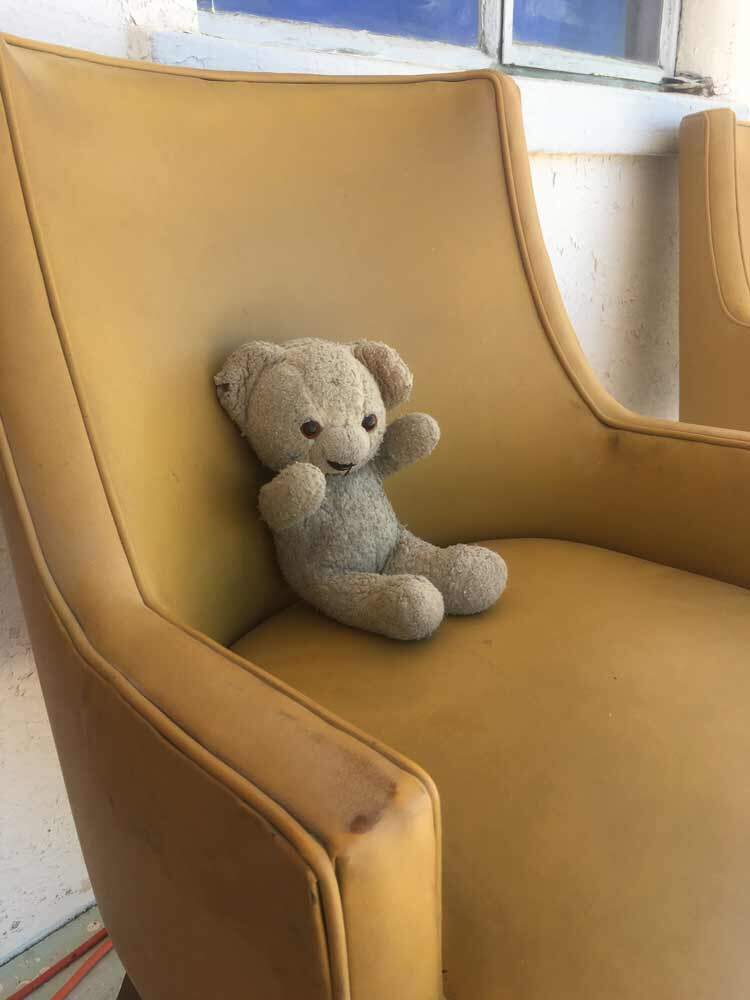Day 2 | Teddy Bear

It’s day two and although the community of women here have accepted me graciously, when I am alone and it is quiet, I think of home. Not only the physical buildings or places that define my home, but faces of the people I knew, loved, and miss. After the sadness comes anger. Anger because of greed, corruption, and the stubbornness to change has led us to this new place. And we are the lucky ones. We have been able to find an alternative water resource. We are civil. We are slowly building trust and a real community. But what about everyone else who had to leave their homes because there was no water? Abandoned loved ones, loved places, who never made it to a water source? Who has had the resources to travel and find water and who was left to die? It has happened. It’s here. It’s not make believe or a scary story. It’s happening everywhere, every day. The United States is not one of the first countries to experience this painful reality. We are one of the last…
Interview 1:
“I guess that I feel guilty. Not only that, but I feel afraid. And it’s a justice issue because my country among a few others, have allowed for this to happen, while using racism, capitalism, elitism, classism, on a global scale…”
-What is your definition of happiness?
“I have no idea…I don’t even know the last time I felt happiness. Um, I’ve felt excitement and I’ve felt love and I’ve felt contentment. I don’t know what makes happiness unique. Maybe it’s a mixture of those things.”
-What makes you happy?
“Knowing that I have lots of time to do a new and exciting thing, my boyfriend, my siblings being loving, laughing with my family, feeling like I have accomplished something, and pretty things. Having meaningful conversations with people.”
-Are you happy right now? Why or why not?
“No, I am not. Because I am anxious, and not the happy kind.”
-What physical objects or technologies affect your happiness and why?
“Social media is a big factor, I spend a lot of time scrolling, and being connected with people who say very positive things, makes me feel good. Helps my anxiety reduce and allows me to feel happiness. I also have a little teddy bear and he reminds me of my life. I got him when I was three and he reminds me of my whole life I have lived, including my family that has passed away. He gets me relaxed.”
-Has limited access to water affected your overall state of happiness and if so, how?
“Existentially. It’s a reminder of real struggles in society and the environment that people face particularly at the hands of western globalized society and economy. So, yes. Severely.”
-What is one thing you wish you could do right now that you feel would bring you happiness, but you are currently unable to do it because of your environment or access to water?
“I would be texting and I’d be eating all my favorite foods.”
-How has your happiness changed since you have been here?
“It has gone down. I feel like… I just have so much time, I have the opportunity to live life very sustainably within my needs, so I’m trying to work through that and I’m trying to figure out how to make myself happy and feel like I am living my life in a meaningful way. Living my life in a way that I want it to be lived. And I’m slowly, slowly, centimeter by centimeter, getting there. It’s just difficult because I have social anxiety.”
-As of 2023, the extreme water regulations are newer to the United States population, yet in other cultures and communities around the world, the energy required for securing and maintaining water is consistently this difficult, if not more. How has this experience allowed you to empathize and think about other areas and cultures of people that have such limited access to water?
“I guess that I feel guilty. Not only that, but I feel afraid. And it’s a justice issue because my country among a few others, have allowed for this to happen, while using racism, capitalism, elitism, classism, on a global scale, and so when I think about these issues happening in the united states. I am not hopeful because I think that these forces of racism and other injustices will make it impossible to ration water and build communities, and so in that way I have been able to emphasize. I think I’m still in the shock factor and paralyzed and thinking about how I will be affected. And I have to remind myself that this is happening right now. In Syria, in East Africa.”
-Can you tell me anything else about your current state of happiness?
“I’m struggling to feel happy here because we are all still very individualistic, but I see some serious efforts to share resources, share knowledge, and share compassion. So it makes me fearful that I am not doing my part of doing enough to build that really empathetic and compassionate space. It’s showing me how much work I need to do within myself in order to be that leader, and I don’t think I am using my time wisely. But I have to take my time. It is a slow process. And I hope I am able to trust myself more and build something.”


